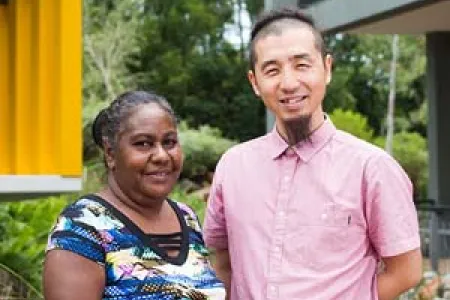Unique teamwork opens way to Yolŋu Studies
A unique collaboration between a Japanese man and an Indigenous “Birrkili Gupapuyŋu” woman is helping to teach Charles Darwin University students Yolŋu languages and culture.
Yasunori Hayashi (Nori) came to the Northern Territory from Tokyo in 2003 to follow his interest in music and learning to play the digeridoo.
It was the start of his immersion in Indigenous languages and culture, which lead him on a path to help teach Yolŋu Studies at CDU.
“Travelling to several communities throughout the Northern Territory, I was told that without learning the language, it was not possible to play the digeridoo properly,” Nori said. “It (playing the instrument) is all about the placement of the tongue, and pronunciation is very important in that.”
After completing his Masters by research in Yolŋu Knowledge Practice at CDU, Nori has teamed up with Brenda Muthamuluwuy from Galiwin'ku in north-east Arnhem Land to assist students who are enrolled in Yolŋu Studies.
“The course is for anyone who wants to learn about our languages and culture, whether you work in the public services or private enterprise, or those who are just interested to learn more about the Indigenous people of the Northern Territory,” Ms Muthamuluwuy said.
“It gives us an opportunity to share our knowledge with others to increase understanding and also improve communication between Indigenous and non-Indigenous people.”
Ms Muthamuluwuy said she had heard about Nori before working with him at CDU.
“I had heard of a Djapaŋ (Japanese) man who could speak my language,” she said. “He had travelled around the NT living with and learning from my people.”
Nori said there were some similarities between Yolŋu and Japanese cultures.
“We have similar beliefs in the way we look at how the natural world is connected to our culture,” he said.
Ms Muthamuluwuy said that learning Yolŋu was a little different to what people might expect, and that understanding the kinship beliefs of Yolŋu was vital to learning the language.
“For the first half of each lesson we teach students about kinship in relation to the section of language we are going to cover,” she said. “It is wonderful to hear the students speaking Yolŋu. It really opens the door to many opportunities to improve communication.”
Ms Muthamuluwuy and Nori are working for Yolŋu Studies under the guidance and permission of Yolŋu languages and cultural authorities from north-east Arnhem Land.
